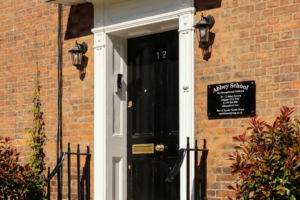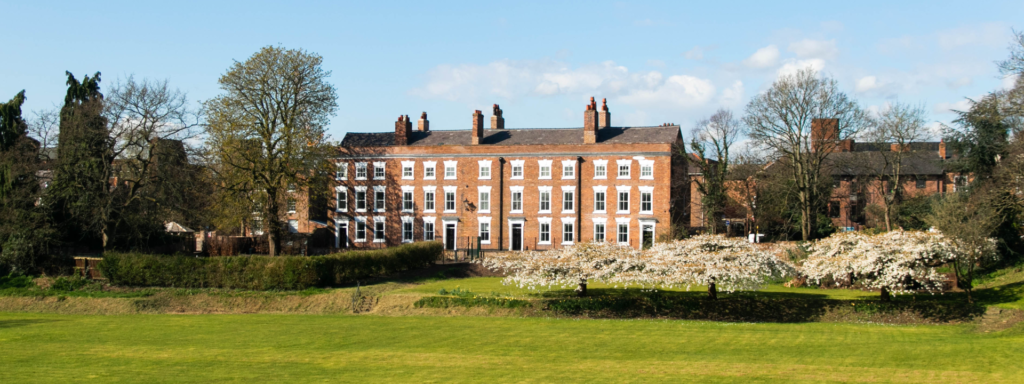Our brand new school and centre of excellence for special educational needs and disability in the UK is set to open in Chester.
Based in a Grade II* listed building in the heart of Chester’s historic Abbey Square, Abbey School is due to open in Autumn 2020. It will provide children and young people with exceptional needs with the very best possible educational experience.
The day and residential school will have up to 75 places for children and young persons aged four to 19 years. It will cater for pupils with a diagnosis of autism and/or severe learning difficulties, who may display behaviour of concern or behaviour that challenges families and services.
Abbey School brings together everything that is known from special education research and best practice to provide an outstanding teaching and learning experience, with the wellbeing of pupils and staff sitting at the heart of the school’s philosophy.
Dr Katy Lee, Principal, said: “We are creating a centre of excellence, where every seed of potential is identified and nourished, where every exceptional child is engaged and important, and ultimately, a place where all school users are able to thrive. Our aims are to improve the life chances of our pupils through education and learning, and to extend the prospect of an improved quality of life for family members and others.
“As part of this commitment, we are harnessing and pioneering outstanding global research and educational innovations to drive positive change in the sector and create a truly outstanding educational experience. Our strategic research alliance with Bangor University and the University of Warwick is a key element in our approach, and one that we hope will benefit not just children at Abbey School, but create a framework, which other schools will be able to utilise.”
Employing a holistic approach, which targets learning and development through mutual engagement and participation, the Abbey School Model draws on a range of academic, social, and functional activities. The school’s highly trained multi-disciplinary team will deliver a pupil-centred, blended curriculum. It seamlessly integrates academic and social learning with Positive Behaviour Support – a framework for assessing, promoting, and evaluating behaviour change in an ethical and culturally sensitive way.
Core to the school’s approach will be a strategic research partnership with SEND experts at Bangor University and the University of Warwick– both institutions are globally renowned leaders in the field of SEND educational research and development.
The Abbey School Educational Research Alliance (ERA), will see Abbey School collaborate on a number of initiatives with both universities to develop the very best possible educational outcomes and experiences for children and young people at the school.
Professor Carl Hughes, Head of the School of Education and Human Development at Bangor University, said: “The Abbey School ERA programme will bring together high quality academic research tools and innovative approaches to monitor and explore the effectiveness of the teaching and learning process from a holistic, wellbeing focused perspective. “Abbey’s innovative programme offers an unprecedented opportunity to work across organisations to combine learnings from globally relevant research coupled with the real world experiences of pupils and school users as we work in partnership to create new approaches to ensure the best possible educational experience.”
Professor Richard Hastings, Deputy Head of the Centre for Educational Development Appraisal and Research at the University of Warwick, commented: “The ERA represents the next step in two decades of research developed close to educational practice in special schools in the UK. The chance to be involved in the design of the educational environment for a school from the start is an exciting opportunity. We will be working to ensure that the best research evidence is implemented in Abbey School for the benefit of the young people, their families, and staff.”
The school is investing over £1 million in research, development, evaluation, and training – working closely with the leading universities to introduce innovative approaches that give young people an outstanding educational experience which enables them to thrive.
Eventually, Abbey School plans to create an ‘open-source’ model for its research, where other schools and teachers will be able to access its research, and draw on the learnings and findings from ERA within their own educational settings.
Professor Sandy Toogood, Head of Clinical Services, said: “Early intervention is incredibly powerful, and we know that investing in young people early can have a significant impact on the outcome of the rest of their lives. Our approach will equip pupils with the tools to be able to navigate rewarding futures, where they are able to contribute to society, and play a role in making positive choices about the direction their lives take.”
Other key initiatives being developed by the school include the creation of a new App, which will enable the school to evaluate and ensure the wellbeing of all school users, and help to ensure optimum effectiveness of teaching and high levels of engagement across all year groups.
The App will help staff plan, deliver, and monitor provision for meaningful participation by pupils in activities of living and learning at school, home and in the community. It will seamlessly interface with Person Centred Plans (PCP), Positive Behavioural Support (PBS) plans, and Education Health Care Plans (EHCP). While data from the App will provide evidence of school activity and pupil outcome to aid commissioning decisions and inspections.
Unlike any other specialist school in the UK, Abbey School also offers attractive funding solutions to placing Local Authorities, which can finance the school fees for all pupils attending the school.In the current climate this could be a great support to Local Authorities wishing to place with the school.
Abbey School Leadership welcomes commissioners and directors of Local Authorities to get in touch with us, in order to explore this opportunity.
This piece was first featured in Cheshire Live, and The Standard.


